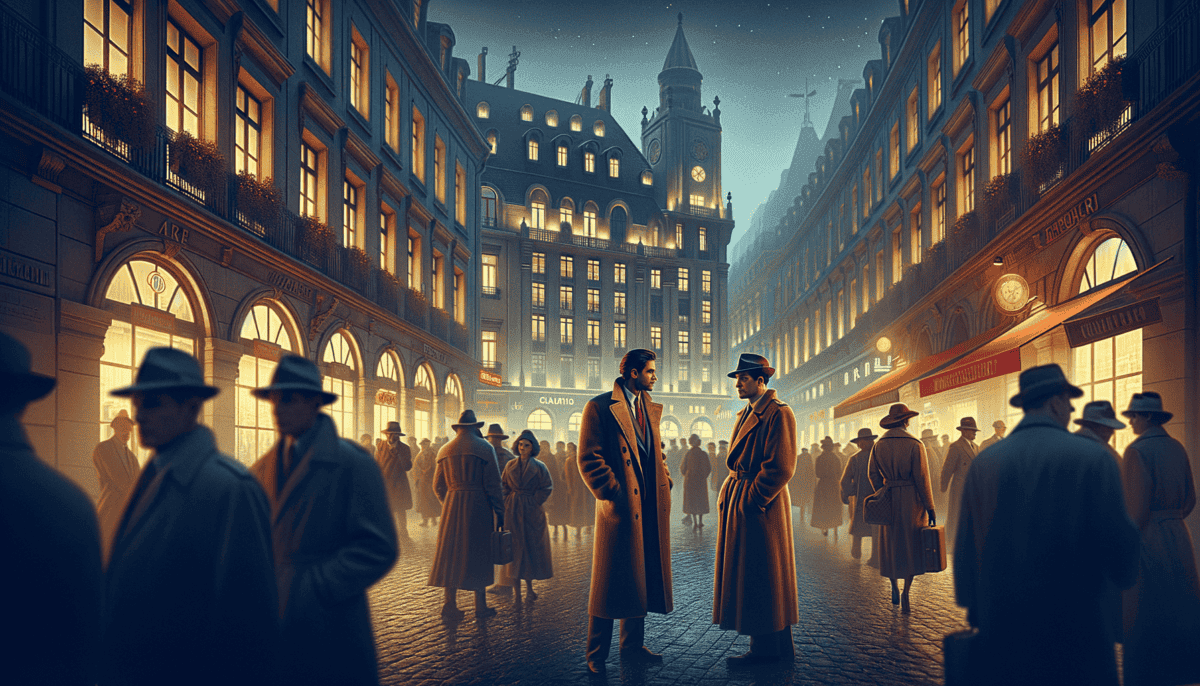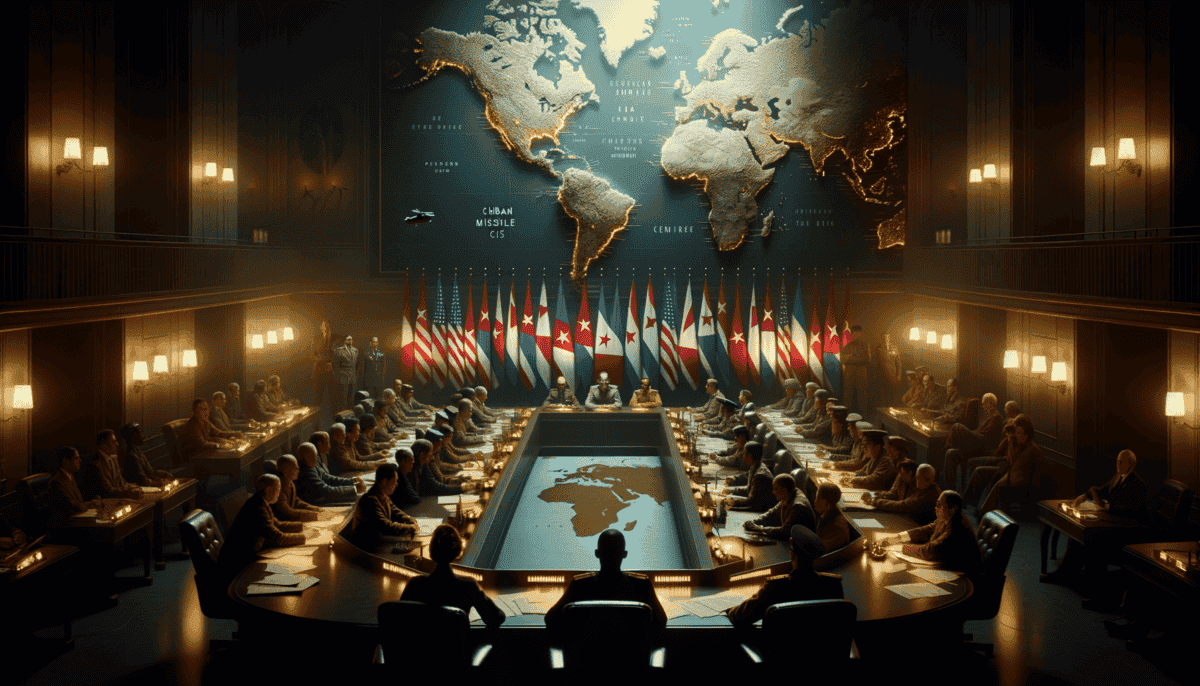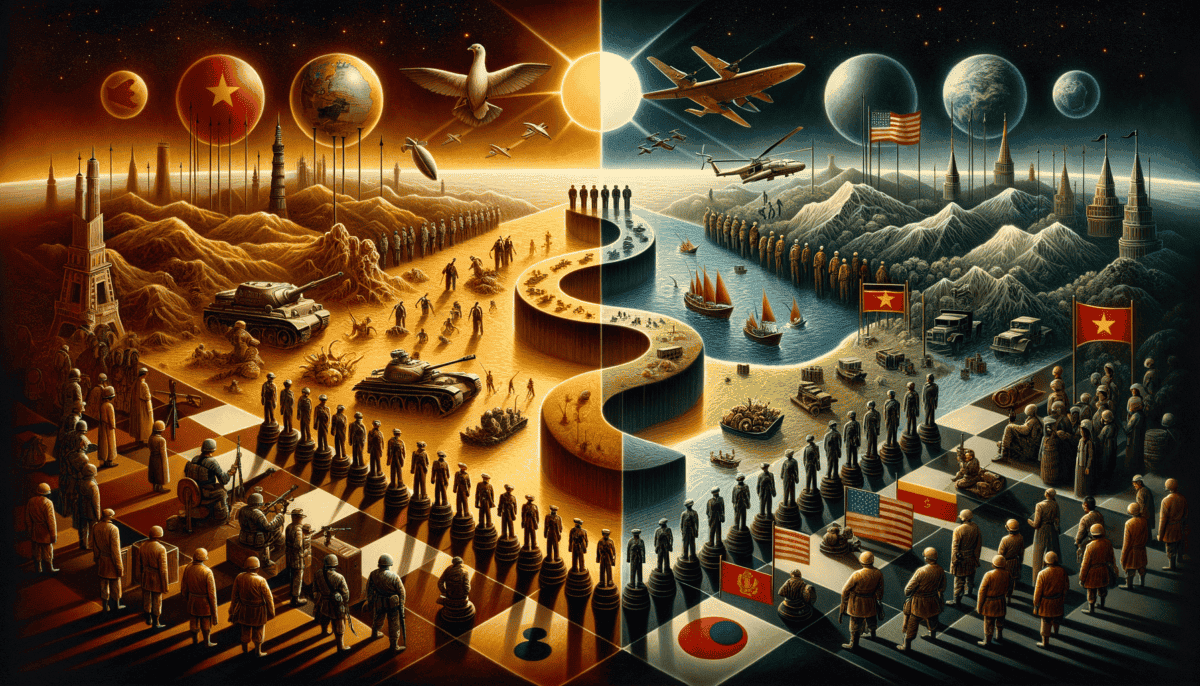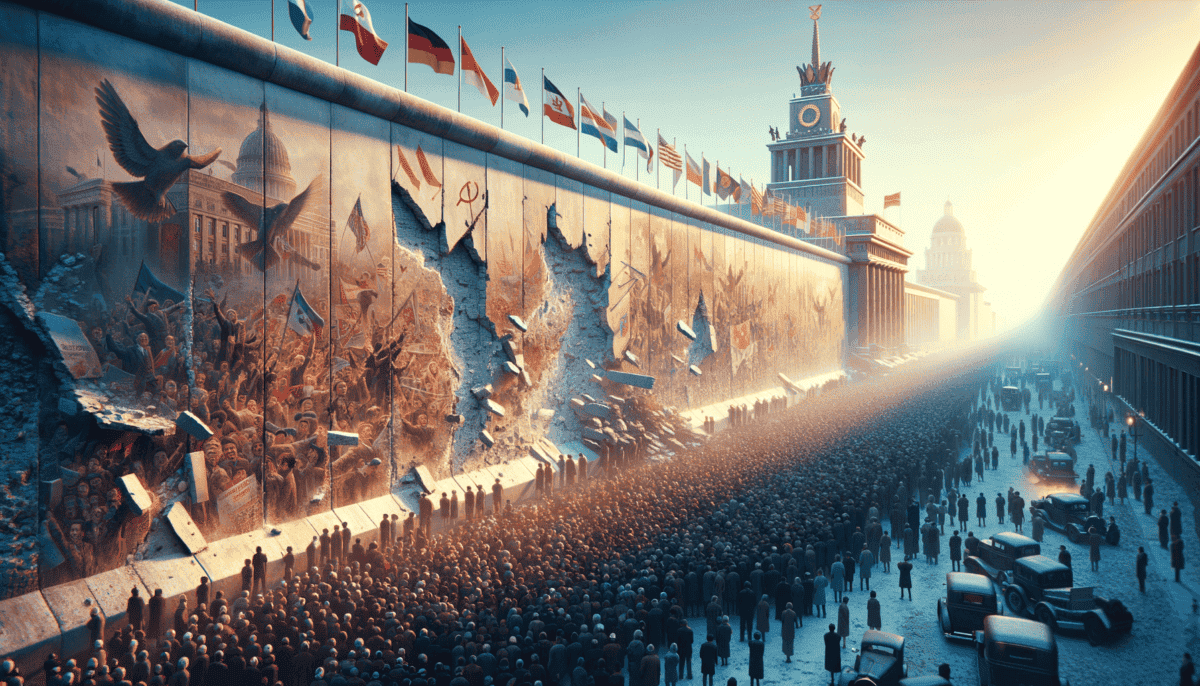The Iron Curtain Rises
Sarah Thompson stared out her classroom window in West Berlin. The year was 1945, and her world was changing fast. The big war was over, but something new was starting. She could feel it in the air.
"Today, we're going to talk about what's happening in our city," Mrs. Weber said, pointing to a new map on the wall. The map showed Berlin split into four colored parts. ️
"But why is our city divided?" Sarah asked, raising her hand.
Mrs. Weber smiled sadly. "Well, after the war, four different countries are now in charge of different parts of Berlin – America, Britain, France, and the Soviet Union."
Sarah noticed things were different when she walked home that afternoon. American soldiers stood on one street corner, while Soviet soldiers watched from another. They never smiled at each other.
"Papa," Sarah asked at dinner that night, "why don't the American and Soviet soldiers like each other?"
Her father put down his fork. "It's complicated, liebchen. The Americans and Soviets have very different ideas about how to run a country. They're like two team captains who can't agree on the rules of the game."
The world was becoming like a giant game board, with two main players:
- The United States and its allies (called the Western Bloc)
- The Soviet Union and its allies (called the Eastern Bloc)
Sarah's best friend Elena lived in East Berlin. They used to play together every day, but now Elena's family talked about moving further east. "The Soviet leaders say we'll be safer there," Elena explained during their last playdate.
“But we’ll still be friends, won’t we?” Sarah asked, holding Elena’s hand tight.
“Of course! No silly wall can stop our friendship,” Elena promised.
They didn't know it then, but a wall would indeed come – not just any wall, but one that would split their city in half. People started calling it the Iron Curtain, though it wasn't made of iron at all.
Mr. Thompson listened to the radio every night. Sarah heard words like "Cold War" and "nuclear weapons," but they seemed like grown-up problems. Still, she noticed how her father's face got more worried with each passing day.
One evening, Sarah heard President Truman speaking on the radio: "We must help free peoples to work out their own destinies in their own way."
"What does that mean, Papa?" Sarah asked.
"It means America wants to help countries stay free to make their own choices," her father explained. "They're calling it the Truman Doctrine."
– Truman Doctrine: America’s promise to help countries stay free
– Iron Curtain: The invisible line dividing Europe
– Cold War: A fight between countries without actual battles
By 1949, everything had changed. The city felt colder somehow, even in summer. Sarah's school got new textbooks, while Elena's school taught different lessons. Their parents stopped visiting each other. The invisible line between East and West grew stronger every day.
Sarah kept a diary where she drew pictures of her changing world. She drew soldiers, divided cities, and two little girls holding hands across a line. Maybe one day, she thought, the line would disappear.
At night, Sarah would look out her window toward where Elena lived. The stars still shone the same way on both sides of the city. "The stars don't care about East and West," she whispered to herself. "They just shine for everyone."
The radio kept talking about more changes coming. Sarah didn't understand all of it, but she knew one thing for sure – her world would never be the same again. The game board was set, and the pieces were moving. A new kind of war had begun, one fought with words and fears instead of bullets and bombs.
Shadows and Secrets
Tommy Miller couldn’t sleep. It was 1952, and his dad was acting strange lately. Every night, Dad would disappear into his home office with a special briefcase. ️ Tommy heard whispers and strange clicking sounds coming from behind the door.
“Mom, why does Dad lock himself in his office?” Tommy asked over breakfast.
His mother stirred her coffee slowly. “Your father has an important job helping keep our country safe, sweetie.”
One day, Tommy’s class got a new student named Ivan. He spoke with a funny accent and kept to himself. “My family just moved from Moscow,” Ivan said quietly when the teacher introduced him.
Some kids whispered and pointed. Tommy remembered what his dad said about Moscow being in the Soviet Union – the place America didn’t trust. But Ivan looked lonely, so Tommy waved him over at lunch.
“Want to share my sandwich?” Tommy asked with a smile.
Ivan’s face lit up. They became friends, sharing stories about their different homes. Ivan told Tommy about the snow in Moscow, while Tommy taught Ivan about baseball.
But not everyone liked their friendship. Some parents told their kids to stay away from “the Russian boy.”
One evening, Tommy saw his dad talking to a man in a dark suit through the kitchen window. They passed papers back and forth, looking around carefully. When Tommy asked about it later, his dad just ruffled his hair and said, “Sometimes grown-ups have to keep secrets to protect people.”
- Things Tommy noticed were different:
– More locked doors at school
– Strange radio messages at night
– New security cameras in town
– Grown-ups whispering about “agents” and “classified”
At school, they started having special drills. “If you see anything suspicious, report it to your teacher,” the principal announced. Tommy wondered if being friends with Ivan was suspicious.
One day, Ivan didn’t come to school. Tommy asked his teacher where Ivan was, but she just shook her head. “His family had to leave suddenly,” she said.
– Spy: Someone who secretly watches and collects information
– Classified: Information that must be kept secret
– Agent: A person who works secretly for their government
That night, Tommy heard his parents talking in hushed voices. “Another family gone,” his mom whispered. “The KGB must have called them back.”
“This is how it works in the intelligence game,” his dad replied softly. “People appear and disappear like shadows.”
Tommy started keeping a notebook of strange things he noticed. He drew pictures of mysterious men in suits, wrote down weird code words he heard, and kept track of which families suddenly moved away.
Sometimes he saw his dad meeting different people in the park, passing newspapers that looked too thick to be normal. Other times, he noticed cars following their family when they drove to the grocery store.
At the library, Tommy found books about codes and started practicing writing secret messages. Maybe if Ivan ever came back, they could write to each other in code. He imagined his friend somewhere in Moscow, maybe doing the same thing.
The world felt like a giant game of hide and seek, where no one knew all the rules. Tommy’s dad called it “the world of shadows,” where nothing was quite what it seemed. But Tommy learned something important – even in a world of secrets and spies, friendship could still bloom, if only for a little while.
Every now and then, Tommy would look at the empty desk where Ivan used to sit and wonder where his friend was now. He kept Ivan’s drawing of Moscow’s snow-covered buildings tucked safely in his notebook, a reminder that sometimes the best secrets were the friends we had to keep in our hearts.
Thirteen Days of Fear
The morning sun felt different on October 16, 1962. Sarah Jenkins noticed her parents huddled around the radio, faces tight with worry. Her dad, who worked at the White House, had dark circles under his eyes.
“Honey,” her mother said, voice shaking. “School is cancelled today. President Kennedy will speak to the nation tonight.”
Sarah watched her neighborhood change overnight. Army trucks rumbled down their quiet street. People rushed to stores, buying lots of food and water.
“Why is everyone so scared, Daddy?” Sarah asked.
“Sometimes grown-ups have big problems to solve,” he answered, hugging her tight. “President Kennedy is working hard to keep us safe.”
That night, they all sat around the TV. President Kennedy looked serious as he told everyone about the missiles in Cuba. Sarah didn’t understand all the big words, but she knew it was important.
The next days felt like holding your breath for too long. Everyone was waiting, hoping nothing bad would happen.
- Changes Sarah saw:
– More planes in the sky
– Empty shelves in stores
– Kids learning duck-and-cover drills
– Parents whispering about fallout shelters
At home, Sarah’s mom started keeping extra food in the basement. They practiced going to their “safe spot” – a corner filled with blankets and flashlights.
Sarah’s best friend Lucy told her about the letters they wrote at her house. “Mom says if something happens, we should have nice words written down for each other,” Lucy explained.
– Missiles: Big rockets that can hurt people
– Nuclear: A very powerful and dangerous type of weapon
– Crisis: A very scary and important problem
One night, Sarah heard her dad on the phone: “The Russians aren’t backing down. Kennedy’s trying everything.” She hugged her teddy bear tighter.
At church, people prayed more than usual. Sarah’s Sunday school teacher said, “Sometimes the scariest storms pass if we just hold on to hope.”
Sarah started drawing pictures of happy things – butterflies, rainbows, and kids playing. She gave them to worried-looking grown-ups to make them smile.
On TV, they showed ships in the ocean near Cuba. Sarah’s dad explained that American ships were stopping Russian ships from bringing more missiles.
“It’s like a game of chicken,” her older brother said. “But nobody can win this game.”
Finally, after thirteen long days, good news came. The Soviet leader, Mr. Khrushchev, agreed to take the missiles away. Sarah had never seen her parents look so relieved.
That night, they had ice cream for dinner to celebrate. “The world worked together to solve a big problem,” her dad explained. “Sometimes being brave means talking instead of fighting.”
Later, Sarah found messages from her mom tucked under her pillow – little notes saying “I love you” that were meant for the scary days. She kept them in her special box, remembering how close the world came to being very different.
The fall leaves started turning orange and red, life went back to normal, but Sarah noticed people seemed kinder to each other. Maybe being scared together helped them remember what really mattered – taking care of each other.
Racing to the Stars
Tommy Parker couldn’t sleep. The summer night of 1969 buzzed with excitement. Tomorrow, his dad would take him to the Space Center in Houston where they would watch something amazing.
“Dad, tell me again about the moon race!” Tommy bounced on his bed, too excited to stay still.
Tommy’s dad worked at NASA, helping build rockets. He sat on the edge of the bed and smiled. “Well, it all started when the Soviets sent Sputnik into space in 1957. That little beeping satellite surprised everyone!”
Tommy knew this story by heart, but he loved hearing it. “And then we started catching up, right?”
“That’s right, sport. First dogs went to space, then brave astronauts like Alan Shepard and John Glenn.”
At school, Tommy and his friends played astronauts during recess. They built pretend rockets from cardboard boxes and counted down to blast-off. His teacher, Mrs. Robinson, hung a big map of the moon on the wall.
- Space Race Firsts:
– First satellite (Soviet Union)
– First animal in space (Soviet dog Laika)
– First person in space (Soviet cosmonaut Yuri Gagarin)
– First American in space (Alan Shepard)
Every new space mission felt like turning a page in an exciting book. No one knew what would happen next!
Tommy’s mom kept a scrapbook of newspaper clippings about space. She pointed to pictures of the Apollo missions. “Look how far we’ve come,” she said. “From dreaming about flying to actually touching the stars.” ⭐
The Saturn V rocket was as tall as a 36-story building! It used enough fuel to drive a car around the Earth 800 times!
At the Space Center the next day, Tommy watched with hundreds of other people. The room was full of big computers and busy scientists. ️
“Look, there’s Neil Armstrong and Buzz Aldrin in the rocket!” Tommy squeezed his dad’s hand. “Are they scared?”
“They’re brave,” his dad answered. “But it’s okay to be both brave and scared.”
The countdown began. Everyone held their breath. The rocket roared to life, shooting flames and smoke. “Go! Go! Go!” Tommy jumped up and down.
For days, they watched Apollo 11 travel through space. Tommy’s class listened to mission updates on the radio. They drew pictures of astronauts floating among stars.
Finally, on July 20th, the big moment came. Tommy sat cross-legged in front of their black-and-white TV. The whole world seemed to pause.
“That’s one small step for man, one giant leap for mankind,” Neil Armstrong said as he stepped onto the moon.
Tommy saw tears in his dad’s eyes. “We did it, son. Humans are walking on the moon!”
That night, Tommy looked up at the moon from his backyard. It seemed different now, knowing his heroes had walked there. Maybe someday he would go to space too.
His mom brought out moon pies to celebrate. “The space race taught us something important,” she said. “When people work together and dream big, anything is possible.”
In class, Mrs. Robinson started teaching about new space goals – space stations, Mars missions, and exploring deep space. The race to the stars was just beginning.
Shadows Across the World
Sarah watched the news with her parents in their suburban home. It was 1975, and the TV showed soldiers in far-off places she’d never been.
“Why are there so many wars, Mom?” Sarah asked, hugging her favorite stuffed bear.
“It’s complicated, sweetie,” her mother replied, turning down the volume. “Remember how we talked about the two big teams – America and the Soviet Union?”
Sarah nodded. Her class had discussed this during their current events lesson. Her teacher used a simple game to explain it:
“Imagine two team captains picking players for their teams at recess. But instead of picking kids for kickball, they’re trying to get different countries to join their side.” ♀️
Sarah’s uncle Jack had fought in Vietnam. He came home different, quieter. Now he taught at the local high school and helped Sarah with her homework.
- Major Proxy Wars:
– Korea (1950-1953)
– Vietnam (1955-1975)
– Afghanistan (1979-1989)
One afternoon, Uncle Jack spread a world map on the kitchen table. “See these colored pins? Each one shows where the two sides are competing for friends.” ️
More than 20 countries around the world were caught between the United States and Soviet Union during this time.
Sarah’s best friend Maria had family in Afghanistan. “My cousins say Russian soldiers are everywhere now,” Maria told her during lunch. “They’re scared.”
“Why can’t everyone just be friends?” Sarah asked her dad that evening.
“Sometimes grown-ups forget how to share and work together,” he explained. “Just like in your playground when kids fight over the swings.”
At school, Sarah’s class wrote letters to children in other countries. They learned about different cultures and traditions.
“Even if our leaders don’t agree,” her teacher said, “we can still be friends with kids everywhere.”
Sarah started a peace club at school. They made colorful posters and collected supplies for refugee families. Her principal was so impressed, he gave them a special award.
One day, Maria brought exciting news: “My cousins are safe! They moved to a peaceful place.”
Uncle Jack came to Sarah’s class to talk about his experiences. He didn’t discuss the scary parts. Instead, he told stories about the kind people he met and the beautiful places he saw.
That night, Sarah added a new page to her diary. She drew a picture of Earth with children holding hands all around it.
“When I grow up,” she wrote, “I want to help people understand each other better.”
The evening news still showed conflicts, but Sarah noticed something new – stories about peace talks and countries working together. Maybe the grown-ups were finally learning to share after all.
Her mother hung Sarah’s peace club poster on the fridge. It showed two hands reaching across a divide, almost touching. Below it, Sarah had written in bright colors: “Friends make better neighbors than enemies.” ❤️
A New Dawn Breaks
Sarah sat in her history classroom in 1989, now a high school senior. The TV showed something amazing – people dancing on top of a huge concrete wall in Berlin.
“The Berlin Wall is coming down!” her teacher announced, tears in her eyes. “This is history happening right before our eyes!”
Maria, still Sarah’s best friend, squeezed her hand. “My parents say this means the Cold War might really be ending!”
Uncle Jack visited their class that day. He looked happier than Sarah had seen him in years. “Watch closely, kids. The world is changing right now.”
Sarah remembered the peace club she started years ago. Some of those same posters still hung in the school hallway. One showed hands reaching across walls – just like what was happening in Berlin!
“Sometimes the best walls are the ones we tear down together,” Uncle Jack said, smiling at his niece.
Over the next two years, more amazing changes happened:
- Key Events of 1989-1991:
– Berlin Wall falls
– Soviet Union breaks apart
– New countries become free
– Cold War ends
Sarah watched news reports showing people celebrating in cities across Eastern Europe. They waved flags and sang songs of freedom.
Her old diary entry from years ago caught her eye: “I want to help people understand each other better.” Now it was happening all around the world!
Countries that were once enemies started working together. People could visit places that had been closed off for decades.
In December 1991, Sarah and her family watched the Soviet flag come down from the Kremlin for the last time. A new Russian flag went up instead.
“The Cold War is officially over,” her father said quietly. “The world will be different for your generation.”
Sarah’s senior project focused on “Building Bridges, Not Walls.” She interviewed people who had lived through the Cold War, including Uncle Jack and Maria’s family.
“The best part about peace,” Maria’s grandmother told her, “is that we can all learn from each other now.”
On graduation day, Sarah gave a speech to her class. She held up her old peace club poster from elementary school.
“We learned that friendship is stronger than fear,” she said. “And that understanding can melt even the coldest walls between us.” ❤️
Uncle Jack hugged her after the ceremony. “You were right all along, kiddo. Friends do make better neighbors than enemies.”
As Sarah packed for college that fall, she found her old stuffed bear – the one she’d hugged while watching war news as a child. She smiled and packed it carefully.
The end of the Cold War opened new doors for cooperation, understanding, and friendship between nations.
Sarah’s college application essay ended with words that summed up everything she had learned:
“The world isn’t divided into sides anymore. We’re all on one team now – Team Earth. And our greatest victory isn’t winning over others, but learning to win together.”






